#like. i do think this is changing insofar as the average female character is less hyperfemme now than she was 10 years ago
Explore tagged Tumblr posts
Text
that post about people ignoring characters who are women in favour of every man ever has its points, as does the post criticising its dismissal of he/him lesbians, but i do think there’s something really interesting/depressing about just how little there is for lesbians and bi women in media as a whole, especially those who are masc or nonbinary or any kind of gender non-conforming or who just have an interest in exploring different forms of masculinity. it creates this phenomenon wherein most women shown in media are significantly more feminine than your average real woman, so when shows or movies have to then portray an allegedly “masculine” woman they make her less feminine than their already hyperfemme characters, which essentially means she now like. wears a leather jacket and boots with her skinny jeans. so she just sort of looks like most women in real life. this means that the closest you get to how a lot of lesbians and bi women are in real life is male characters who are either intended to be the “kinda soppy” “soft” character who’s a bit fem or who are really rugged but in that specific tough yet vulnerable butch way. the other reasons people focus on fictional men to the exclusion of women are true, probably a lot more so than this one, but nonetheless it’s a fascinating and deeply frustrating phenomenon.
#this is where the phenomenon of cw lesbians arises#like. i do think this is changing insofar as the average female character is less hyperfemme now than she was 10 years ago#but not by much and that hasnt heralded a huge shift towards accurately portraying masc women#and there are exceptions to this ofc. charlize theron is really fighting in those trenches frankly#but by and large yeah i do still think this tracks#ESPECIALLY bc to be frank im only half talking abt physical presentation here#and equally referring to things like behaviour and personality#like specifically the sort of grizzled yet vulnerable tough yet romantic masculinity that is almost UNHEARD of in female characters#also this is def a genre thing as well. broadly my points are most applicable to tv and film j think#ais.log
29 notes
·
View notes
Text
Orphan Black season five full review

How many episodes pass the Bechdel test?
100% (ten of ten).
What is the average percentage per episode of female characters with names and lines?
57.62%
How many episodes have a cast that is at least 40% female?
All ten. Eight have a cast over 50% female, and four have over 60%.
How many episodes have a cast that is less than 20% female?
Zero, obviously.
How many female characters (with names and lines) are there?
Thirty-one. Eighteen who appear in more than one episode, twelve who appear in at least half the episodes, and three who appear in all the episodes.
How many male characters (with names and lines) are there?
Twenty-eight. Seventeen who appear in more than one episode, eight who appear in at least half the episodes, and zero who appear in every episode.
Positive Content Status:
As per usual with this show, it’s convinced that just having a lot of women around makes it a great feminist work, but its obsession with female biology and the reek of disdain for it kinda undercut that concept (average rating of 2.9).
General Season Quality:
It suuucks. Full of plot contrivances that go nowhere, random and useless events and characters, and vital development inexplicably happening off-screen while we’re stuck watching episode filler. This is a great season to watch if you want to make a list of all the things you should never do in a narrative.
MORE INFO (and potential spoilers) under the cut:

So, how about that Westmoreland bullshit? With the random old dude who they set up like some ultimate bogeyman, but then it turned out he was a fake and that all the dramatic science talk associated with his little island society was fabrication and the beast-man in the woods was inconsequential and the whole plot took half a season to resolve into actually just a smokescreen for the absence of any plot of actual value? But then they kept the bogeyman anyway so that he could STILL be treated like the ultimate villain whose death signals the freedom of the clones for, um, some reason? Why did they even bother having Susan Duncan survive last season’s stabbing just so she could have her her scientific creator position bizarrely retroactively usurped by ‘Westmoreland’ before she gets killed off for real? Why did they bring back Coady, at all?? Just to pretend that the idiotic Castor sterilisation plot could wedge sideways into a weak endgame idea of implausible longevity-science that doesn’t even exist yet in-story? How about Kira Manning, plot device? Remember how Felix got turfed for half the season so that he could money-trail his way to taking down a shadowy corporate cabal through completely off-screen shenanigans, because actually SEEING the machinations that bring about the culmination of a story is for wimps? Remember how Alison conveniently went soul-searching for half the season so that they didn’t have to write plot for her at all, and then she reappeared with a new haircut and threw out her old personality and still did nothing plot-relevant? I half suspected it wasn’t really her, guys. I thought they were playing some wacky twist where some eleventh-hour evil clone was pulling a Sarah and impersonating Alison, only doing it really badly with stupid hair. Tatiana Maslany is a talented actor, but I’ve mentioned before how huge a role character design plays in selling the idea that you’re looking at a different person, and damn, she did NOT sell me on the idea that she was still Alison, but with a new look. It’s small potatoes compared to the myriad other sins of the season, but it’s just such a dumb thing to fuck up.
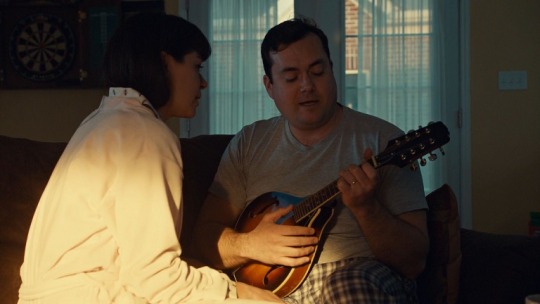
Meanwhile...how about how they brought MK back for one episode only, so that she could do nothing and then be violently murdered? Doesn’t stink like cheap drama at all. Neither does bringing back Gracie Johannssen for one episode and then killing her too, even though it’s illogical for her to return to the series, especially at this awfully-convenient moment. Mark was imminently dying for months and also under the impression that Coady was dead, how did they last-minute make contact with her, get coerced into finding Helena in order to get a cure, AND just-so-happen to know where to look? And then Mark dies too, without even discovering that Grace is dead, both characters just being deleted without fanfare. Cheap drama. As noted, Mark was already dying, so bringing him back to do it onscreen changes nothing, but Grace was eighteen years old, raised in an abusive cult, rendered barren - putting a bullet in her brain now for absolutely no narrative purpose is just cruel. Like MK’s death, and a little like Susan’s as well, the main drive seems to be some writer’s desire to create drama by unnecessarily and excessively harming women, to the point of death. Life is torturous and awful, they lose everything they ever had or valued, and then they get murdered. It comes off pretty misogynistic, to be honest. Pointless murders of female characters tend to get that air about them. Siobhan’s death at least feels earned in-story, insofar as we all expect the characters to lose a close ally by the end and Siobhan has always been the kind of character who plays the hard game and knows she’s more likely to run out of luck than to retire in peace. Coady, also, earned her way to a death (though she should have got it back in season three instead of being revived to finish out the series), however it is, again, a bit weird that she ends up playing second villain-fiddle to a man with no narrative credentials, no pull, and no reason why she - or Susan - should answer to him since both are aware that he’s a fraud. That, also, has a kind of misogynistic smell about it, like someone got antsy about the idea that these female scientists were being given the credit for creating the clones and decided they needed a master. Apparently, they also forgot about Ethan Duncan’s participation, which is doubly weird because he was anti-Neolution. Then again, they forgot that the clone projects were government-sanctioned with military oversight, too, so the whole ‘crazy dude on an island is the Big Bad in Charge’ doesn’t make sense. They also forgot that Coady didn’t know about the Castor pathogen until like, a few months before that plot started happening, so that could never have been her secret plan to sterilise everyone but the 1% who buy into Neolution science or whatever dumbfuck plot they pretended was going on in the end. Remember when this show was actually about clones, briefly, and it almost seemed like there was a plot?

Any discussion of the way a story ends tends to become a discussion of the story as a whole, so I’m not gonna drag this out. If you watched this season yourself, just, think about it: how many of the characters in this season had story arcs? How many of them impacted the plot in a meaningful way that drove the story forward? What was the story that drove forward, anyway? What can you separate out from that oft-maligned unnecessary, cheap drama, the plot events and threads that go nowhere and are not important to the central story or even tangentially to the development of characters who are important to the central story? Even in a season of only ten episodes, for a series which is making a planned ending and therefore should be at its narrative tightest as they squeeze in all the necessary stuff to theoretically finish in a coherent and rewarding way that ties off loose ends and concludes character journeys? How much of it actually needed to be there? It’s really slim pickings, guys. There’s a shocking amount of wasted time in there. I am BAFFLED that there are people who legitimately enjoyed this and thought it was deep. Diff’rent strokes for diff’rent folks and all, but honestly. Baffled. I’m taking the rest to the full season review.
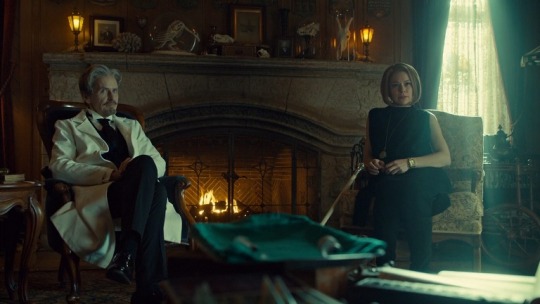
1 note
·
View note
Text
Orphan Black season four full review
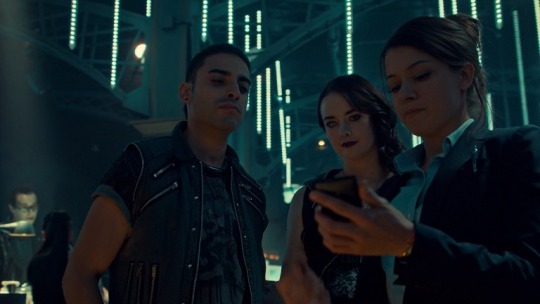
How many episodes pass the Bechdel test?
100% (ten of ten).
What is the average percentage per episode of female characters with names and lines?
59%
How many episodes have a cast that is at least 40% female?
All ten have over 50% female casts.
How many episodes have a cast that is less than 20% female?
Zero, obviously.
How many female characters (with names and lines) are there?
Thirty. Nineteen who appear in more than one episode, twelve who appear in at least half the episodes, and two who appear in every episode.
How many male characters (with names and lines) are there?
Twenty-three. Fourteen who appear in more than one episode, seven who appear in at least half the episodes, and zero who appear in every episode.
Positive Content Status:
Nothing particularly awful for once, but nothing very exciting either (average rating of three).
General Season Quality:
An absolute chore to get through. This show has run out all its goodwill and the illusion that it is about anything more than overwrought plot drama just for the sake of it has been dispelled. The show has always given the impression of believing itself to be more intelligent and complex than it actually is, but it seems to have finally reached an insufferable fever pitch.
MORE INFO (and potential spoilers) under the cut:
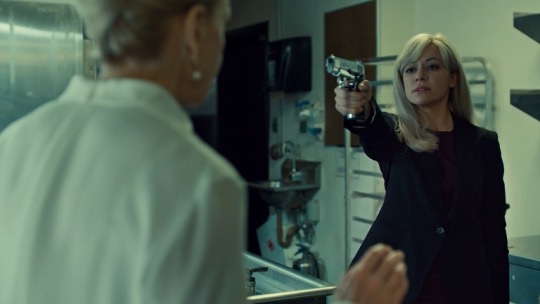
I’ve said it before for various different shows and for various different reasons, but this, my friends, this is why we evaluate content instead of just writing up statistics. This season churned out not just female-led episodes, but a fully female-dominant piece from end to end, easily the most female-heavy season of tv we’ve had on this blog to date. But that does not fucking make it good television, not entertainment-wise, nor from a representation perspective. To clarify: I’m not suggesting that the increase in female presence is in any way responsible for the drop in entertainment quality, I believe the two are mutually exclusive. Representation-wise, the numbers are relevant insofar as I have definitely seen people try to claim feminist triumphs before on the grounds of ‘there’s a lot of women there’, and realistically we all know you’ve gotta ask for more than that. Being present at the table is only the beginning of the battle: if you are relegated to the end of the table, not given anything to eat (or not fed the same as the other dinner guests), not allowed to speak, or not listened to when you do speak, then your issues persist. Being expected to smile politely and just be glad you were invited at all is not how positive representation works. Orphan Black did not commit a litany of feminists sins this season, but neither did the abundance of women on deck achieve anything on a representational front, and I will not praise it for sheer numbers when it isn’t doing anything good with them.
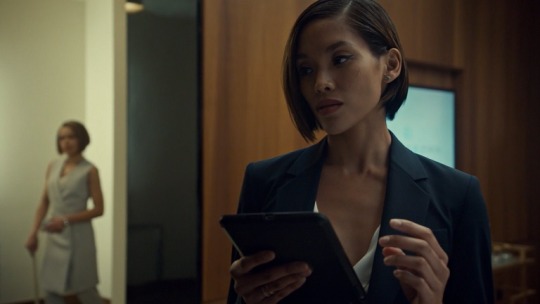
This seems a necessary time to talk about differing standards of expectation in media, and specifically the rigorous demands placed on female-led stories to be ‘perfect’ or otherwise be derided as ‘proof’ that female-led stories ‘don’t work’. Society likes to use individual films/books/tv shows as stand-ins for all the media of like type that could ever exist - think of the endless supply of recent male-led superhero films, some of them excellent, some of them garbage, some of them wildly successful, some of them total bombs, and yet the spectrum of different qualities and receptions never colours the way people perceive the genre as a whole. Enter Wonder Woman, the first female-led superhero film of the current era, and the colossal make-or-break expectations for it as a movie, and for its female director, Patty Jenkins. All eyes were on Jenkins to prove that women could direct big blockbuster action movies - not to prove that SHE could do it, but that WOMEN could - and by the same token, the fate of any future female-led superhero films hung on the success or failure of that one movie. Now, in tv terms, Orphan Black was certainly not standing alone as THE representative for female-led television series, but as part of a minority movement it was and is still subject to the rigours of expectation; that it be good enough, successful enough to bring about more female-led shows in the future, that it convinces the Powers That Be that they can bank on female-led stories. The irony of raising expectations in order to demand the best is that of course, it stacks the deck. Women having to achieve twice as much as men in order to be considered just equal is part of why feminism exists. I bring all of this up because I am very wary of falling into this trap myself, and I need you all to know that when I judge Orphan Black for its lacking quality, it’s with full awareness of the potential double-standard, and not actually motivated by a frustration with the show for ‘letting women down’.
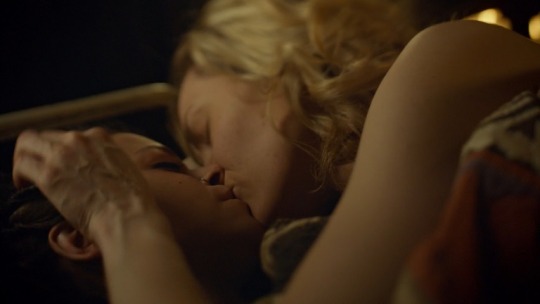
In last season’s review, I talked about jumping the shark, and I said then that I didn’t feel like Orphan Black had made that leap just yet. After this season, I’m reconsidering that assessment retroactively, and it’s because of Beth Childs. The premiere of this season was easily the strongest episode - arguably, the only strong episode - but it also kinda broke the show for me by revealing the fatal flaw: that they began the entire series by sailing over a rapid succession of Goddamn sharks. One ridiculously improbable event to kick off the whole narrative could easily be shrugged off and forgiven - many shows require such a conceit to get going - and Orphan Black got away with it at first by wrapping all its improbabilities into one package: Sarah Manning. The first and largest conceit is that Sarah just-so-happens to not only be present for Beth’s suicide, but that she has the opportunity to look Beth directly in the face and realise that they’re identical right before Beth face-plants a train. BUT THEN, Sarah takes Beth’s bag with all her ID, which Beth has conveniently set aside, allowing her to infiltrate Beth’s whole life. AND THEN it turns out that Sarah happens to be a gifted con artist of trained-spy proportions, both willing and capable enough to shrug on Beth’s identity based solely on the content of some home videos and a wardrobe change. Conveniently, Sarah is able to learn Beth’s mannerisms and accent well enough to approximate her successfully in front of her intimate partners and professional colleagues of multiple years, and she’s physically identical in weight and muscle distribution despite leading a distinctly less athletic lifestyle. I flagged all of these things back when they happened, but the show got away with them at the time because, after all, Sarah’s hustle is the entry-point into the series, so we go with the idea that we need to make that logical concession, just buy the bit, and we’ll get our entertainment in return. Problem is, season four goes and opens with a flashback episode to the time while Beth was still alive, and that busts the whole concession myth wide open.
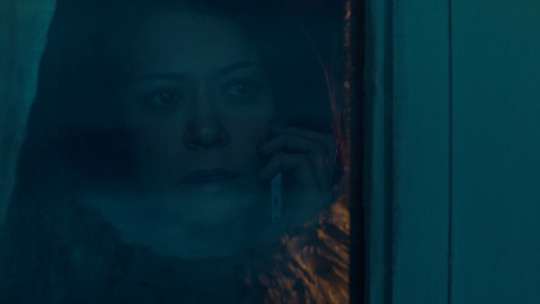
For starters, the plot is already in motion before Sarah shows up. We do realise that back in season one as Sarah negotiates her way around the mess she’s gotten into, but again, we run with the idea that we needed Sarah’s entry to make the whole thing work. The flashback episode shows us how completely false that is - Beth has an entire web of intrigue that we could have been watching instead, and if we’d started the show with her it would have been less jumbled and filled with needless drama than the premiere with Sarah. Imagine if the show started with, say, Beth being contacted by MK for the first time. She spends the premiere fielding tips from this new anonymous source, investigating something whack and presumably Neolution-related, and by episode’s end she forces a meeting with her source only to discover that they’re genetically identical. Cue show. It’s clearer and cleaner than all the futzing around with Sarah taking over someone’s life and faking her own death and having family drama and Vic drama and then having a German shot in her car and not getting around to the actual clone-reveal until three episodes in, and it allows the narrative to build from a logical entry-point instead of dropping into the middle and having to field all sorts of technically irrelevant detail in order to sell the whole idea. The flashback episode gives us a vision of what could have been a far better, more focused, more atmospheric, and more character-driven narrative, still full of drama, but LOGICAL drama, the drama of unfolding a conspiracy and trying to work out what’s real in the clones’ lives, the drama of all of them getting to know each other and adjusting to the revelation of their identity, etc, etc.
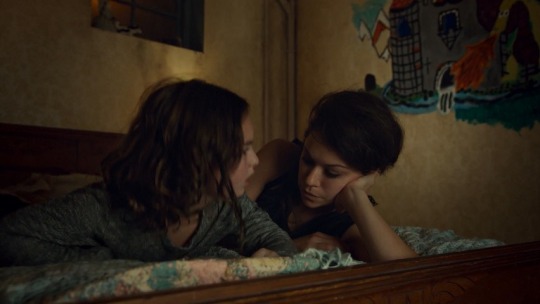
I have railed often and increasingly at how Sarah creates outrageous and unnecessary drama and often complicates the story instead of helping to drive through it, and it’s such a big part of why the show is swallowing itself slowly: it’s so busy being melodramatic for the sake of it and revolving around a reactive character who generates more trouble than she solves, and that leaves us drowning in the middle of the whole thing when we should be headed for shore. The show doesn’t actually need Sarah, and revolving around her because she’s the one with the magical baby-making womb is kinda grotesque and harks back to the issue of representation, because if your show is about women not because they’re people but because they can (sometimes) birth babies, then you’re conforming to the age-old notion that while men can be anything and everything, women are only worth acknowledging if their biological functions are part of the story. I suspect I may have to discuss that particular issue in more detail once the series ends, so I won’t get into it further just now; the point is, Sarah is a needless complication who required extraordinary machinations in order to be part of the story in the first place, and that first act of shark-jumping set the stage for all the ridiculousness that has come since. The show stacked the deck against itself: it set a precedent of needless hyper-drama designed to make the plot look as twisty and crazy as possible, and it has focused primarily and increasingly on looping around itself with more and more excessive conspiracy and back-from-the-dead characters and medical marvels, as if the early narratives about what it means to be a clone (y’know, the stuff that was more centred on characters and their feelings and stuff? The good shit?) and how that situates you within the world and your sense of self was not good enough. I’m remembering with bitter fondness the season one finale, when it felt like the extravagances of the plot were brought together harmoniously into a thoughtful exploration of the clone situation. What a thing this show could have had if it cared more about having a heart than it does about ~shock twists~. Having had the bubble popped on just how pompously ludicrous it actually is, I don’t expect to ever return to those good times, but who knows? Maybe concluding the show will lead them to introspect and try to bring us home on something meaningful in season five. I have little faith in that, but I’m holding out a glimmer of hope, regardless.
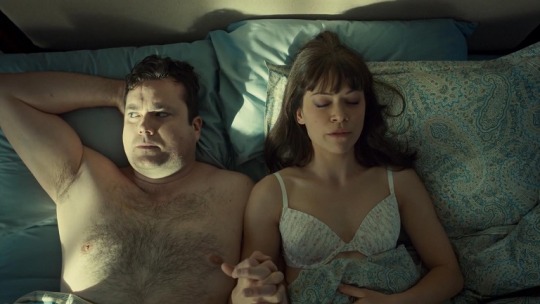
2 notes
·
View notes